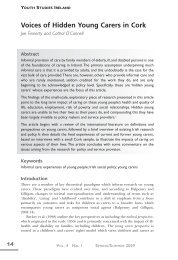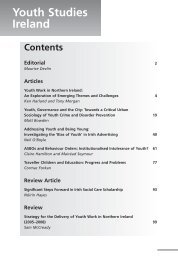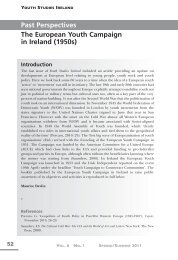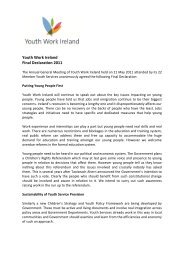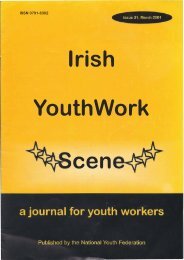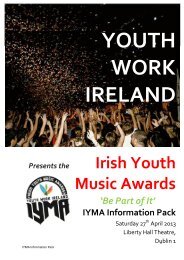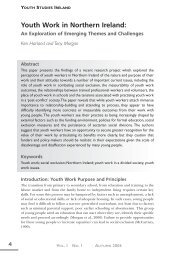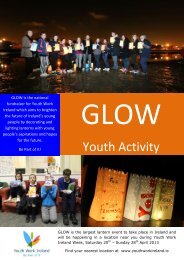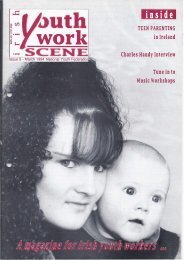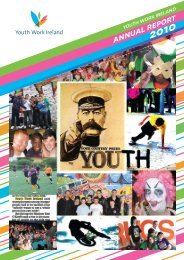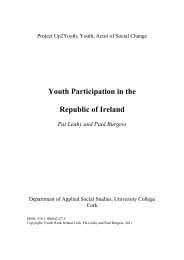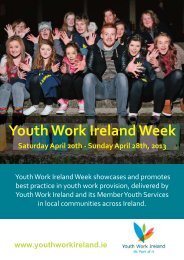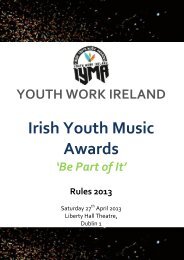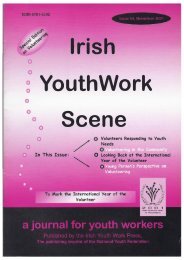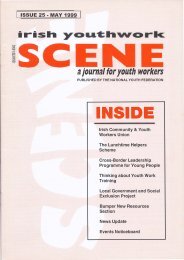Issue 68: June 2011 - Youth Work Ireland
Issue 68: June 2011 - Youth Work Ireland
Issue 68: June 2011 - Youth Work Ireland
Create successful ePaper yourself
Turn your PDF publications into a flip-book with our unique Google optimized e-Paper software.
Irish <strong>Youth</strong> <strong>Work</strong>SceneMagazine for <strong>Youth</strong> <strong>Work</strong> Practitioners in <strong>Ireland</strong>In this edition of Scene...Teenage Perspectives: The needs of young people in MonaghanCDYS <strong>Youth</strong> <strong>Work</strong> <strong>Ireland</strong> ProfileMeath <strong>Youth</strong> Music Acoustic Week <strong>2011</strong>Donegal Talks About SexYoung People & Volunteering Activity SupplementIWA - Access Guidelines for <strong>Youth</strong> Organisations<strong>Youth</strong> <strong>Work</strong> Week in Carlow Regional <strong>Youth</strong> Service<strong>Youth</strong> <strong>Work</strong> <strong>Ireland</strong> Final Declaration<strong>Issue</strong> <strong>68</strong>, <strong>June</strong> <strong>2011</strong>
CONTENTS:Editorial ......................................................2Teenage Perspectives <strong>2011</strong> .........................3CDYS <strong>Youth</strong> <strong>Work</strong> <strong>Ireland</strong> Profile ........5MY Acoustic Week <strong>2011</strong> ...........................7Let’s Talk About Sex Week .....................9Round Up ..................................................11Young People & VolunteeringActivity Supplement ................................12IWA Best Practice Guidelines ................14<strong>Youth</strong> <strong>Work</strong> Week Carlow ....................16IYWC New Library Resources ..............18IYWC Training ......................................20Sector Training .........................................21<strong>Youth</strong> <strong>Work</strong> <strong>Ireland</strong> Final Declaration .22IYWC Recommended Reads ..................23Contributors: Fran Bissett, RichardDorgan, Gina Halpin, Geri Hogarty,Daragh Kennedy, Melissa Mackin,Michael McLoughlin, LorraineThompson and Aoife Walsh.Layout: Gina HalpinPrinting: MetaphorDISCLAIMERIt is open to all our readers to exchangeinformation or to put forward points of view.Send in news, comments, letters or articles tothe editors. Views expressed in this magazineare the contributor’s own and do not reflectthose of the Irish <strong>Youth</strong> <strong>Work</strong> Centre or <strong>Youth</strong><strong>Work</strong> <strong>Ireland</strong>.Production Editors:Fran Bissett & Gina HalpinIrish <strong>Youth</strong> <strong>Work</strong> Centre<strong>Youth</strong> <strong>Work</strong> <strong>Ireland</strong>20 Lower Dominick StreetDublin 1Tel: 01‐8584500Fax: 01‐8724183Email: info@iywc.ieWebsite: www.iywc.ieISSN: 0791-6302EditorialLittle Done, A Lot More to Do!by Michael McLoughlin,Assistant Director, Central Services, <strong>Youth</strong> <strong>Work</strong> <strong>Ireland</strong>Regardless of our economic woes any new Governmentinevitably provides some opportunity for a new and fresh start.This can often be in the major areas such as economic policy, jobsand the environment. However, much of the proposed changeplanned by the new Government very definitely relates tochildren and young people. Clearly the establishment of aCabinet level minister for Children and <strong>Youth</strong> Affairs is a positivemove. For many years youth and children’s groups have advocated for this. Theidea of a “super junior” minister was simply not cutting it in the previousadministration.There has clearly been a bulking up of this cabinet post since its announcementand it will now cover the Irish <strong>Youth</strong> Justice Service, The NEWB and family support.Another crucial commitment has been the establishment of a new Child andFamily Welfare Agency. This move effectively removes the child welfare and childprotection functions from the HSE. Despite being well flagged this is a radical moveand one which is been seen through with vigour.The establishment of a cabinet minister for children is intended to make sure thesecrucial and important issues are heard at the highest level and do not fall betweendifferent departments. The inclusion of youth affairs in the brief and indeed thetitle of the Minister is a vote of confidence for the sector and the work we do. Oftenwe can convince ourselves that our work is not valued at the highest level so weneed to welcome such a fulsome commitment.For the first time the challenges that youth work faces will be directly representedat the cabinet table. Of course there is always the curse of the answered prayer.With the opportunity of being heard at cabinet level goes the responsibility toexplain and communicate in a simple and clear way what we do and whatdifference we make. Whether it is systems to measure outcomes or better onlinecommunications we all have to raise our game.There is also no guarantee that being included in a cabinet role means our work willalways be front and centre. Minister Andrews unfortunately quickly became theMinister for explaining the latest child protection scandal. Again unfortunatelythere are several more reports in the immediate offing that could elicit the sameresponse. Grappling with reform of parts of the HSE, delivering the children’sreferendum and generally fielding dissatisfaction with inevitable further cuts toservices will be a full time job for the Minister. So it is incumbent on the sector tokeep our issues on the agenda. To do this we need to show the relevance of ourwork.The integrated nature of the OMCYA and the new Department is quite innovativein terms of the Irish public service. Integrated public services continue to be a majorchallenge to our state. Countless reports and initiatives have been written on howto achieve this and a lot of money has been put in to local initiatives to advance thisidea on the ground. However, many youth services already offer such integration.They draw funds from different sources and inevitably are expected to deliver ondifferent policy priorities by departments and agencies. Across the diverse policyareas such as health, education and justice to mention but a few, it is voluntaryyouth services who have lead the way. This is an important message for a newminister to hear and to learn from.Irish <strong>Youth</strong> <strong>Work</strong> Scene 2 <strong>Issue</strong> <strong>68</strong>, <strong>June</strong> <strong>2011</strong>
Teenage Perspectives <strong>2011</strong>A report on the needs and youth service provisionfor young people in County Monaghanby Melissa MackinBackground<strong>Youth</strong> <strong>Work</strong> <strong>Ireland</strong> Monaghan’s Monaghan PeaceCafé Project in partnership with the <strong>Youth</strong> OutreachInformation and Training Service undertook a surveycalled “Teenage Perspectives <strong>2011</strong>”. The survey andreport describes the findings completed by youngpeople in the county of their needs and issuesaffecting them. A survey like this under the samename had been done in 1998 but the Peace Caféproject felt that although the report was invaluablethe information was outdated and that currentinformation about what is available to young peopleand what their opinion was would be helpful.Purpose of the ResearchThis piece of research was devised in order to gainan in‐depth insight into the needs of young peoplein County Monaghan, with particular emphasis onyoung people’s view on the peace process and theirinteraction with people from different cultures andcommunities. The research also looks at therecreational needs of young people, services andfacilities available to young people and theconsumption habits of young people around alcohol,nicotine and other drugs.The findings have been put together and can be usedby a variety of organisations, schools, youth orcommunity groups to use as a reference to developinitiatives specifically designed for young people inCounty Monaghan. It is a particularly usefuldocument for the Peace programmes andorganisations delivering elements of the Peaceprogramme as they can see a snapshot of whatyoung people think, and see what some of thecompeting pressures are on young people.Research MethodologyThe survey was drafted with major input from youngpeople and an asset based approach was adoptedwithin the survey, meaning that the survey would askyoung people what they wanted and what positivethings they had to contribute to their communityrather than telling them what they needed andhighlighting the negative aspects of young people.So within the survey young people were asked if theyhave any skills/talents they want to put to use in theircommunity, and there was a “Getting Involved Form”attached which was handed out separately for theyoung people to fill in their contact details, if theywish to get involved in their community. The surveytargeted young people between the ages of 12‐25through various means. Primarily they were surveyedthrough second level schools, but they were alsodistributed in youth clubs, youth projects, librariesand youth information centres. The surveys wereadministered in March; the data from the completed1,133 surveys was collated in May.Research FindingsThe findings found that young people in CountyMonaghan are involved in multiple activities in theirarea and have interests that span sports, music andthe Internet including social networking and YouTube. Despite being involved in many clubs andIrish <strong>Youth</strong> <strong>Work</strong> Scene 3 <strong>Issue</strong> <strong>68</strong>, <strong>June</strong> <strong>2011</strong>
organisations they still feel they are lacking a placeto hang out, a swimming pool and that there are nodiscos in their area appropriate to them. 55% of theyoung people surveyed admitted to drinkingoccasionally, with many drinking at home, in pubsand at house parties with those who do drink,consuming different types of alcohol. 9.6% smoke ona regular basis and with only 10% having taken drugsexcluding alcohol and cigarettes.Young people were asked did they have any skills/talents/strengthsthat they would like to share and putto use with other young people and their community.Of the 51% who responded to thequestion, they had a multitude of attributes to share.This action of young people giving forward what theybelieve are their strengths shows the positive regardyoung people have for themselves and that theybelieve they can share and contribute within theirown community. By believing that they havesomething of worth to pass on shows a level of selfesteem and confidence that young people have.<strong>Issue</strong>s facing young people in County Monaghanreflected by the respondents were drinking, nofacilities or places to hang out, unemployment, peerpressure, bullying and racism and family issues. Themajority of young people feel they do mix well withyoung people from different cultures especially inschools and projects.The young people surveyed do not believe whatreligion people are matters and that everyone is andshould be treated the same. They do feel that thepeace process has had an impact on their lives as it issafer and they have formed friendships both Northand South. They believe having mixed schools andmore cross border projects is the way forward forlasting peace in <strong>Ireland</strong>.For further information or to request a copy of theTeenage Perspectives Report please contact:Melissa Mackin<strong>Youth</strong> Outreach Information andTraining Manager<strong>Youth</strong> <strong>Work</strong> <strong>Ireland</strong> MonaghanCastleblayney <strong>Youth</strong> Information CentreDublin RoadCastleblayneyCo. MonaghanTel: 087 9057598Email: outreachinfo@ywimonaghan.ie,Web: www.youthworkireland.ie/monaghan,www.facebook.com/ywimonThis project is part financed by the EuropeanUnion’s European Regional Development fundthrough the Peace III Programme and fundedthrough Monaghan Peace III Partnership. <strong>Youth</strong><strong>Work</strong> <strong>Ireland</strong>‐Monaghan’s <strong>Youth</strong> InformationService is part‐funded by the Office of the Ministerfor Children and <strong>Youth</strong> Affairs.Next StepsFrom the findings <strong>Youth</strong> <strong>Work</strong> <strong>Ireland</strong> Monaghanwill be setting recommendations for their ownorganisations in order to acknowledge what theyoung people in this survey have said. From thereport it is apparent that as youth workers andeducators we have to provide young people withwhat they need depending on their age, gender,community and status but we also have to listen towhat they want and work in partnership with themrather than isolation.Irish <strong>Youth</strong> <strong>Work</strong> Scene 4 <strong>Issue</strong> <strong>68</strong>, <strong>June</strong> <strong>2011</strong>
Profiling Local <strong>Youth</strong> Services:CDYS <strong>Youth</strong> <strong>Work</strong> <strong>Ireland</strong>byRichard Dorgan, CDYS <strong>Youth</strong> <strong>Work</strong> <strong>Ireland</strong>Recognising the Contribution of VolunteersA recent survey of CDYS <strong>Youth</strong> <strong>Work</strong> <strong>Ireland</strong>volunteers found that they are contributing anaverage of 19 hours a month to work with youngpeople in the diocese. The findings outline howimportant the volunteers are in the organisation.CDYS have over 300 people volunteering in differentareas of the organisation including supervising youthactivities, facilitating youth groups andadministration.The survey is part of CDYS’ plan to improve howbusiness is done and give volunteers a voice when itcomes to shaping the future of the organisation.CDYS Director Brian Williams explained“Volunteers are at the centre of all the good workwe do so it made sense to get ideas and viewsfrom them when it comes to planning our future.”Marketing and PR officer Richard Dorgan said,“We are lucky to have such fantastic volunteerswho are at the heart of everything we do. Wetake the skills and interests of our volunteers,along with the needs of the young people and tryto amalgamate the two. For example, a volunteerin Mallow who is an extremely talented dancerbegan giving dance lessons a few years ago. Hisgroup have grown and developed into anextremely successful dance group who haveperformed in many live shows in the area. Theyhave even recently begun taking privatebookings.”CDYS Midleton volunteers being presented with volunteerachievement awards at the recent CDYS <strong>Youth</strong> <strong>Work</strong> <strong>Ireland</strong>AGM. Left to Right – Patrick Burke (CEO <strong>Youth</strong> <strong>Work</strong> <strong>Ireland</strong>),Martin Forrest, Susan O’Shea (CDYS <strong>Youth</strong> <strong>Work</strong>er), LisaParker, Ross Bonner, James O Donovan, Brian Williams(CDYS Director) and Noel O Connor (CDYS Chairman)Brian continued“CDYS is a great place to volunteer andwe do our up most to ensure that both ourvolunteers and young people get the mostout of our organisation.”In recognition of the contribution that volunteersmake towards the work of CDYS <strong>Youth</strong> <strong>Work</strong><strong>Ireland</strong>, volunteers were presented with volunteerachievement awards at the recent AGM of theorganisation.CDYS Fermoy Boat Building ProjectCDYS Mallow volunteers receiving special achievementawards at at the recent CDYS <strong>Youth</strong> <strong>Work</strong> <strong>Ireland</strong> AGM. Leftto Right: Cllr Dan Joe Fitzgerald, Patrick Burke (CEO <strong>Youth</strong><strong>Work</strong> <strong>Ireland</strong>), Margaret Curtis, John Dunlea, Niall Moriarty,James Lowe, Miriam Nyhan (CDYS <strong>Youth</strong> <strong>Work</strong>er), BrianWilliams (Director CDYS) Noel O’Connor (Chairman CDYS)Nearly four months of hard work came to a headwith the launch of two man‐made canoes on theBlackwater River in Fermoy last December. Theproject secured funding from the small grants fundfrom the southern regional drugs task force to workwith a group of young people on a boat buildingproject.Irish <strong>Youth</strong> <strong>Work</strong> Scene 5 <strong>Issue</strong> <strong>68</strong>, <strong>June</strong> <strong>2011</strong>
The three local young men Bradley Mills, MichaelMcSweeney and Barry Coughlan, built and paintedtwo 16 foot wooden canoes from scratch with boatbuilders Meitheal Mara. Eleven weeks of hard workaccumulated in a launch of the boats on the 15th ofDecember.Speaking at the launch, Community Drugs <strong>Work</strong>erMartina Munnelly said“A huge amount of work, time andcommitment went into building these boatsand it was great to see the support theseyoung people received at the launch.”Martina went on to thank James O’Sullivan from therowing club for helping out with safety, artist PaulaRoche for helping out with the paint design andCiaran Barry from the <strong>Youth</strong> Centre for providing thespace to build the boat.Michael McSweeney testing out his new canoeThey hope to continue to use the canoes anddevelop their skills on the water over the comingyears, so look out London Olympics 2012.If you would like to learn more about thework of CDYS <strong>Youth</strong> <strong>Work</strong> <strong>Ireland</strong>please contact:Richard DorganMarketing & PR OfficerCDYS ‐ <strong>Youth</strong> <strong>Work</strong> <strong>Ireland</strong> ‐ Co CorkMallow Community <strong>Youth</strong> CentreNew RoadMallowCo. CorkTel: 022‐53526Website: www.cdys.ieLeft to Right ‐ Aaron Lynch, Michael McSweeney, BradleyMills, Barry Coughlan, Pádraig Ó Duinnín (Meitheal Mara),Martina Munnelly (Community Drugs <strong>Work</strong>er CDYS), JessicaLane (Student <strong>Youth</strong> <strong>Work</strong>er CDYS) at the Canoe launch.There was a great turn out for the launch where theyoung people were presented with Certificates fromlocal counsellor Noel McCarthy who congratulatedthe young men on a fantastic achievement beforehitting the water to show off their newly constructedmachinesThe moment of truth came and went without a hitchas the canoes hit the water and the young buildersspent about an hour out on the water testing themout.Irish <strong>Youth</strong> <strong>Work</strong> Scene 6 <strong>Issue</strong> <strong>68</strong>, <strong>June</strong> <strong>2011</strong>
MY Music Acoustic WeekIntroductionThe aim of MY (Meath <strong>Youth</strong>) Acoustic Week is topromote young local musicians, to give youngpeople an opportunity to showcase their talents andfurthermore to introduce new people to our Meet &Eat <strong>Youth</strong> Café. Its Mission statement is:‘To encourage and support the creativeabilities of young people in their communities,to promote imagination, self esteem andself expression in a showcase eventwhere the wider community can see it’MY Music Acoustic Week <strong>2011</strong> came about as aresult of the huge interest in the Irish <strong>Youth</strong> MusicAwards (IYMAs) and also through chats with youngmusicians and singers who were looking for a placeto perform as there are not many venues available tothem.<strong>2011</strong>by Geri Hogarty,Regional Director, Meath <strong>Youth</strong> FederationOur <strong>Youth</strong> Arts <strong>Work</strong>er, Keith Lane, joined Meath<strong>Youth</strong> Federation in July 2010 through theCommunity Employment Scheme. His backgroundwas in business but he felt a change in career waswhat he needed. He has a keen interest in music andis passionate about encouraging young people tolearn through the medium of music.With the help of volunteers Keith put out the word toschools about the Acoustic week and it didn’t takelong for the young people to start calling in to ‘booka slot’. 15 artists were allocated a 20‐30min. slot andthe event was full for the February mid‐term break.The project was run during the February mid‐termbreak over 5 evenings from 6.30pm‐9.00pm. Theevent saw over 30 students from Beaufort College,St Patricks Classical School, and St Michaels Loretotake to the stage in the <strong>Youth</strong> Café over the course ofthe week. Up to 80 young people and parents camealong to show support for friends and family.This was also a chance for us to promote our‘Meet & Eat <strong>Youth</strong> Café’ as a place that providesopportunities for involvement in a variety ofactivities for young people.“These events are so beneficial forthe younger people around here, not onlyhave they discovered the youth café exists,but so many of them now realise that thereare so many other musicians or fans ofmusic in one area, and they all come togetherand had great fun here this week”.Comment from volunteer about ProjectIrish <strong>Youth</strong> <strong>Work</strong> Scene 7 <strong>Issue</strong> <strong>68</strong>, <strong>June</strong> <strong>2011</strong>
On one night during the week, after a band played arather energetic set, a young girl from Ardcath, Co.Meath, stood on stage alone to sing. No drums, noheavy guitar sounds, just a voice and a simplebacking track, and she silenced the audience.For further information pleasecontact:Geri HogartyRegional DirectorMeath <strong>Youth</strong> Federation14 Ludlow StNavanCo. MeathTel: 0469 022707Email: myfed@eircom.netOn the last night one of the more well known <strong>Youth</strong>acts played us out and we had practically everyperson (young and old) up on their feet, which wasa great joy to see.The Acoustic week was held during the midtermbreak, and it highlighted the fact that so many youngpeople are looking for events like this to keep themoccupied, and to give them something to do whenoff from school.“We are so lucky to have had this week,and are so thankful for the staff at MY Fedfor their support, it’s so hard for us to getgigs around town, and this was perfectfor everyone. Thanks”.Comment from Young Person about Project.The <strong>Youth</strong> Café was the perfect venue, and we hopethat this sort of event can be run as successfully asthe last, more often!!!Following the huge success of ‘MY Music AcousticWeek <strong>2011</strong>’ the young people have asked to helporganise regular events as they are best placed tosource other young bands and musicians and also tohelp promote the events.Irish <strong>Youth</strong> <strong>Work</strong> Scene 8 <strong>Issue</strong> <strong>68</strong>, <strong>June</strong> <strong>2011</strong>
Let’s Talk About Sex WeekbyLorraine Thompson, Donegal <strong>Youth</strong> ServiceIntroductionDonegal <strong>Youth</strong> Service (DYS) in association with theDonegal Sexual Health Forum held a Sexual HealthAwareness Week from Monday 11 th until Friday 15 thApril <strong>2011</strong>. The rationale behind the event is thatyoung people are not receiving adequate and moreoften no sex education at school and for many youngpeople they are not receiving this information in thehome either.Young people are getting most of their informationfrom the Internet and there is a missing link in termsof how they make sense of all the information thatthey are bombarded with on a regular basis throughthe Internet, mobile phones and other social media.Communication about the event was sent out togroups who work with young people and parents –schools, youth groups, and community groups etc,to encourage them to start planning one or moreactivities which would contribute to a county widecalendar of events on the week for example aparents information evening, sexual healthawareness activities for young people or just simplya conversation with young people about sex.Donegal <strong>Youth</strong> Service co‐ordinated a mediacampaign and compiled a list of all activitiesoccurring during the week so that the message isclear that is okay to talk about sex.What we DidSome of the events that took place during the weekincluded the following:The DYS Letterkenny <strong>Youth</strong> Information Centre<strong>Youth</strong> Media Group made a short film looking atyoung people’s attitudes and knowledge of sexualhealth/ education. This film is now going to be usedas a resource for groups to use.Aim and Focus of the WeekThe aim of the week was to promote healthy andsupportive conversations with young people aboutsex, sexual health and sexuality. Participation wasencouraged from adults to get involved, especiallyparents, family members, teachers, youth workersand all the key influencers in young peoples’ lives.The focus of the week was to ensure that youngpeople are supported in terms of having someone totalk to and make sense of all the mixed messagesthey get and to know where to go to find factual,understandable information.The Breakout Group ran an extra drop in session forparents of LGBT young people. The invite went out toparents of older LGBT individuals as well as theparents of current group members in to discuss theirexperiences in order to promote conversationsaround coping with having an LGBT young personand how to initiate conversations, what language touse etc. For the purpose of this event, the sessionwas renamed ‘Let’s Talk about Sexuality.’The youth outreach worker ran ‘Love Hurts’ –Sexual Health Train the Trainers for DYS staff, CEworkers and volunteers. The event took place overtwo days and the participants explored the factsaround sexual health issues, alongside gainingconfidence and expertise in how to plan, implementand evaluate their own programmes/sessions intheir own clubs and projects.Irish <strong>Youth</strong> <strong>Work</strong> Scene 9 <strong>Issue</strong> <strong>68</strong>, <strong>June</strong> <strong>2011</strong>
DYS Daybreak and Breakout groups organised an ArtExhibition focusing on the Lets Talk about SexCampaign. The Art pieces where shown in theRegional Cultural Centre during LTAS week. TheDaybreak project also ran Sexual Health Awarenesssessions with participants during LTAS week.The LOFT <strong>Youth</strong> Project focused on Sex andRelationships during LTAS week, the Hify group willlook at myth‐busting and Q&A with expert. PeerLeader group will also do myth busting workshop.Q&A box was be set up in the LOFT for young peopleto ask questions, and answers were posted on theLOFT webpage and DYS Facebook pages.Let’s Talk About Sex Facebook PageDYS established a Facebook page to increaseawareness and publicise events during the SexualHealth Awareness Week at:www.facebook.com/letstalkaboutsexdonegalThe Lets Talk About Sex Facebook page is up andrunning and has been used so far to give informationon upcoming events and to discuss various TVprogrammes featuring sexual health awareness. Staffalso set up a survey on survey monkey and havelinked this survey to the Facebook pageLocal RadioA local radio station hosted 5 speakers over 5 dayswith a different focus each day.Monday: An older woman talked about how peopledidn’t talk about sex in ‘her day’ and a youngerwoman talked about Irish society now.Tuesday: DYS <strong>Youth</strong> Information Officer along withtwo young people talked about the Internet,pornography and the mixed messages young peopleare being bombarded with.Activities by Other AgenciesLetterkenny Women’s Centre are launching theirYoung Womens Sexual and Reproductive Health CareClinic.HSE Health Promotion are co‐ordinating three ‘Underthe Goosebury Bush’ courses for parents in relationshipsand sexuality education.Schools were slower to come on board but DYS hadsome contact with an update on their currentprovision and ongoing programme. One schoolinvited in two youth workers to deliver an STIinformation session to 4th Years. Another schoolinvited in our LGBT youth worker to run sessions onsexuality as part of SPHE with Leaving Certs, 1st and4th Years and linking into the Healthy SchoolsProgramme.Overall the week went really well, it was anexperiment to try and dispel the notion of sex as ataboo subject. Donegal <strong>Youth</strong> Service are keen tomake sure the event takes place again next year andwould welcome contact from other groups whowould like to get involved and initiate similar weekfor young people in their area.For further information please contactLorraine ThompsonRegional DirectorDonegal <strong>Youth</strong> Service16‐18 Port RoadLetterkennyCo. DonegalTel: 074 9129630Fax: 074 9127612Web: www.donegalyouthservice.ieWednesday: A HSE Officer talked about parents andtalking to your child about sex.Thursday: A parent of a young lesbian and herdaughter told their story.Friday: The Womens centre staff talked about theirnew sexual health clinic and sex education project.Irish <strong>Youth</strong> <strong>Work</strong> Scene 10 <strong>Issue</strong> <strong>68</strong>, <strong>June</strong> <strong>2011</strong>
ROUND UPGrowing Up in <strong>Ireland</strong> ‐ Series of Key InfantKey Findings Documents Now AvailableThe three briefing documents aim to summarise the mainresults from this round of the project and focus on(i) Pregnancy and Birth (ii) Infant Health and (iii) Childcareand Parenting Support. The documents can bedownloaded from www.growingup.ie/infantpublicationsMore detailed findings on a wide range of issues on theInfant Cohort are available in ‘Growing Up in <strong>Ireland</strong> – TheLives of 9‐month‐olds’ (2010), also available to downloadfrom the same page.The Anonymised Microdata File (AMF) from Wave 1 of theInfant Cohort (at 9 months) is now available from the IrishSocial Science Data Archive (ISSDA). Potential userswishing to access the anonymised data should apply tothe Irish Social Science Data Archive (ISSDA) athttp://www.ucd.ie/issda/data/growingupinireland/Launch of “We Volunteer!” OnlineExhibition for Young PeopleCalling All Third Level Students! Add your volunteeringstory today at www.wevolunteer.ie and help reach thetarget of 365 student volunteer stories ‐ one story a dayfor the European Year of Volunteering <strong>2011</strong>!Building on the successful artistic photographic exhibitioncurrently touring <strong>Ireland</strong>, “We Volunteer!” has launchedan accompanying Online Exhibition. Student volunteersare welcome to post up their volunteering story atwww.wevolunteer.ie building further acknowledgment ofthe value which student volunteers bring to theircommunities and inspire others to take up the challengeduring the European Year of Volunteering <strong>2011</strong>. Thelaunch of a virtual exhibition at www.wevolunteer.ieenables students to share their stories and read fellowvolunteer experiences.Coca Cola 125 Years Thank You FundFor more information please contact Jillian HeffernanCommunications Officer, Growing Up in <strong>Ireland</strong>,Tel: 01 8963378; Email: jheffern@tcd.ieIYWC Library Database Available OnlineThe Irish <strong>Youth</strong> <strong>Work</strong> Centre’slibrary database is now available tosearch online from the Irish <strong>Youth</strong><strong>Work</strong> Centre’s website. The databasecontains over 4,700 youth andcommunity specific academic books, trainingmaterials, reports, DVDs and other resources. Membersof the IYWC can borrow up to four items for a duration oftwo weeks. Items can be posted out to members outsideof Dublin. If you wish to take out membership of theIYWC, the membership form is also on our website.On May 8th, <strong>2011</strong>, The Coca‐Cola Company celebrated itsFounder's Day. On that day, 125 years ago, the first Coca‐Cola was sold in Atlanta, Georgia. Coca‐Cola first arrived inNorthern <strong>Ireland</strong> in 1934 and the Republic of <strong>Ireland</strong> in1952. To celebrate 125 years, Coca‐Cola has establishedthe Coca‐Cola 125 Years Thank You Fund, in partnershipwith The Wheel and the Northern <strong>Ireland</strong> Council forVoluntary Action NICVA.Coca‐Cola are donating €125,000 to the fund which willbe granted to non‐profit community, voluntary andcharitable organisations throughout the island of <strong>Ireland</strong>to help support initiatives focused on the following areas:Social and Education Programmes aimed at <strong>Youth</strong>,Healthy and Active Lifestyles, and Environmental Leadership.Ten organisations will receive €10,000 each andfive organisations will receive €5,000 each.For full details please see:http://www.coca‐cola.ie/125‐thank‐you‐fund/To seach the database simply go to:http://www.iywc.ie/library‐database/Irish <strong>Youth</strong> <strong>Work</strong> Scene 11 <strong>Issue</strong> <strong>68</strong>, <strong>June</strong> <strong>2011</strong>
Young People & VolunteeringActivity Supplementby Gina HalpinThe EU has designated <strong>2011</strong> as the European Yearof Volunteering. For young people volunteeringcan offer a great way to help build their personaland professional development, while at the sametime giving them an opportunity to build on skillsor interests they have. It is also a fun way to meetnew people.This activity supplement looks at the positive gainsyoung people can get from volunteering, and, whatthey can contribute by volunteering.Start a discussion that considers the mostpowerful motivators for young people offeringtheir time free of charge. Remind them of thethings that can be gained such as:Skill Acquisition - Job & Communication SkillsPersonal & Professional Development - TrainingConfidenceExperience - Could be added to their C.VHaving Fun - Meeting new peopleNew Challenges - Great life experiencesSatisfaction - By making a differenceWidens Horizons - Through the ability to exploredifferent sorts of career or job opportunities in avoluntary capacityAnd the things young people could bring to anorganisation:Activity OneWhy Do People Volunteer?Aim: This exercise encourages young people to seethe personal and social benefits of volunteering.Materials: Flipchart paper and markers.Start by suggesting that young people often engagein voluntary activities, even if they do not labelthem as such. For example, they might help acharity raise money, get involved with a politicalcampaign or fundraise for their school or sportsteam. Have the young people discuss in smallgroups the following:EnergyEnthusiasmA Fresh PerspectiveSkills and Abilities - particularly in I.TA <strong>Youth</strong> Point of ViewConclude that volunteering comes in many formsand levels of commitment and is often linked topersonal values and a wish to help a cause thatpeople are linked to by experience or family andfriends.Source: <strong>Youth</strong> <strong>Work</strong> Now, January <strong>2011</strong>Any voluntary work that they have done.Why they got involved.What they get out of it.After 10 minutes hand out the flipchart paper andmarkers and ask the young people to list theirreasons under the following headings “Personal”,“Family/Friends”, “Community” and “Social”.Irish <strong>Youth</strong> <strong>Work</strong> Scene 12 <strong>Issue</strong> <strong>68</strong>, <strong>June</strong> <strong>2011</strong>
Activity TwoVolunteer Action Diamond NineAim: This is a sorting activity to explore thereasons why young people don’t volunteer.Materials: Enough sets of the Volunteer ActionDiamond Nine cards (see below) for the youngpeople to work in small groups and someinformation about local volunteering opportunities.Divide the young people into groups of fours orfives and hand each a set of the “Volunteer ActionDiamond Nine” cards.The task is to read the cards and then rank them inthe order of what they believe to be the mainbarriers to volunteering, through to those that theythink are not so likely. These should then be placedto make a diamond shape, with the top reason atone end, and the least at the other.When every group has finished, start a roundrobin, taking a ranking from each group andcomparing it to where other groups have placed thesame card.Start debate about the reasons given and ask theyoung people why someone might choose not tovolunteer. Sum up the session by discussing thewide range of opportunities available from localand national campaigns.Volunteer Action Diamond NineThey don’t know about the opportunities availableThey don’t have the timeThey hold stereotypes about the type of people whodo voluntary workThey don’t know anyone else who doesvoluntary workThey think they don’t have any skills to offerThe advertising for the organisation puts them offThey do not believe that anything they dowill make a differenceThey would prefer to be paid for workThey think it will be boring and a waste of timeSource: <strong>Youth</strong> <strong>Work</strong> Now, January <strong>2011</strong>Activity ThreeA Check List for Young PeopleFor young people who are considering volunteeringhere is a Check List the youth worker could useto go through with themHow much time do I have to give? - How muchtime can they spare for volunteering? It is up tothem, remember other commitments like family,study and hobbies.What period of time can they commit to volunteering?For example, one hour a week, more or less?Summer? Some charities may require theirvolunteers to stay for a minimum period of time socheck before you commit.How will they get there? - Do they have their owntransport? If not, is it easy for them to use publictransport?What kind of Volunteering would they like to do?Do they have a particular interest in animals or art,or working with children. This would ensure theyenjoy the volunteering work and it could give thema better insight into a potential career option.Taking the first steps... advice fromVolunteer Centres <strong>Ireland</strong>There is currently no standard age at which youngpeople in <strong>Ireland</strong> can volunteer. The decision is leftto the voluntary organisation. There are a numberof ways in which you may consider gettinginvolved as a volunteer:1. Contact a local Volunteer Centre to see ifthey have volunteer opportunities appropriateto your age group.2. Some organisations may be willing to takeon youth volunteers as long as they have anadult supervisor.3. You may wish to consider volunteering witha parent, older brother, sister or friend whois 18 years or older.4. Talk to your teachers about how your classor school can get involved - your schoolmay have a club that has a communityservice component where students volunteertogether as a member of a group.6. Your local youth group may have aprogramme for youth to volunteer.Source: www.volunteer.ieIrish <strong>Youth</strong> <strong>Work</strong> Scene 13 <strong>Issue</strong> <strong>68</strong>, <strong>June</strong> <strong>2011</strong>
Irish Wheelchair AssociationBest Practice Guidelines:Designing Accessible EnvironmentsHave you ever wondered if the building currently inuse for youth services in your area is wheelchairaccessible?Has a young person with a disability everapproached your service, but has been unable toparticipate due to an inaccessible building?Do you need advice as to how to make simplechanges to your building to make it moreaccessible?About the Best Practice Access Guidelines:The IWA Access Guidelines recognises and respondsto societal changes. People with disabilities lead fullyindependent lives, and rightfully expect to be able toparticipate in all aspects of society. Young peoplewith physical disabilities may wish to join their localyouth service, but may have been unable to do so inthe past because of an inaccessible building orfacility.Do you need information about building anaccessible facility?Have you been looking for a document that couldanswer some basic questions about accessibility?The Irish Wheelchair Association (IWA) hasproduced a set of access guidelines to providesimple easy to use pointers that will supportorganisations large and small to improve the level ofaccess to their buildings.A major obstacle to social inclusion and communityparticipation facing young people today is access tothe built environment. If a young person who uses awheelchair or any other mobility aid noticed thattheir local youth service building was wheelchairaccessible or had a ramp outside, this may give themthe confidence necessary to approach that serviceand explore what the service could offer them. Frompast experience, IWA knows that this could result inlife changing experiences for young people withdisabilities, opening the door to a wide range of newopportunites.The IWA <strong>Youth</strong> Service works with various agenciesto develop participation opportunities for youngpeople with physical disabilities and the accessguidelines can assist youth workers to make theirfacility or building accessible and inclusive to allyoung people.The IWA Access Guidelines are used to inform andinfluence plans for the development of new facilitiesor for the upgrading of existing buildings. Byfollowing these guidelines, youth services can buildfacilities which meet the highest possible standardsand ensure that basic access requirements areincorporated.Daragh Kennedy, IWA’s National <strong>Youth</strong> DevelopmentOfficer, encourages all youth workers who areconsidering rennovating or making changes to thebuilding from which their service is provided, todownload a copy of the IWA Access Guidelines fromwww.iwa.ie. Speaking about the importance ofimproving access to youth service buildings he said:“The Access Guidleines can be used to inform andsupport youth workers on a number of access issueswhich may be restricting a young person with adisability from participating in their local youthIrish <strong>Youth</strong> <strong>Work</strong> Scene 14 <strong>Issue</strong> <strong>68</strong>, <strong>June</strong> <strong>2011</strong>
service. The guidelines are an important tool inhelping create a society that accomadates all peopleregardless of age or ability. An accessible facilitycould lead to fuller inclusion in youth programmesand activities. This can have a major impact on ayoung person with a disability, enabling them to notonly become an active member of their local youthservice, but facilitating community participation,access to education, employment and improvedquality of life.”The development of the guidelines involved takinginto account national and international regulations,best practice guidelines and standards, as well as lifeexperiences of many of IWA’s 20,000 members.Young people with disabilities also contributed to thedevelopment of the guidelines, sharing theirexperiences of inaccessible amenities which theirable bodied peers enjoy.IWA’s Access Guidelines are often used by theAssociation to influence legislation and improveaccess standards in <strong>Ireland</strong>. By following theseGuidelines, youth services will be ensuring that theaccess needs and requirements of people with aphysical disability are fully met.To download a copy of the Access Guidelines go towww.iwa.ie or request a hard copy form the IWAInformation Department on 01‐818 6485.About Irish Wheelchair Association <strong>Youth</strong> Services:The Irish Wheelchair Association (IWA) is a nationalorganisation dedicated to the achievement of fullsocial economic and educational integration ofpeople with disabilities as equal, independent andparticipative members of the community.The Association plays a central role in highlightingthe issues which affect its members in their day‐todaylives and their capacity to participate fully andequally in society.IWA as an organisation for people with physical andsensory disabilities advocate and lobby for the:Rights and equality of people with disabilitiesbeing respected and upheld.Social and economic inclusion of peoplewith disabilities.Government to invest in measures thatenact on legislation and enhance the qualityof life for people with disabilitiesThe Association has a vibrant and active youthservice, supporting young people with disabilitiesaged from 13 to 30 years of age. The ethos of theIWA <strong>Youth</strong> Service is one of partnership andopenness with young members, and all activities aredriven by their needs, wishes and requirements.Other resource materials available from IWA:View from Here Resource ‐ This resource whichcontains a DVD and support booklet has beenproduced to provide a disability awarenesseducational resource for young people. It isinteractive and is ideal for group work sessions as itstimulates discussion and challenges young people,youth workers and volunteers to think about thesimple steps they can take, the attitudes they canchoose and the decisions they can make to improvehow young people with disabilities are treated.Integr8 Resource ‐ Integr8 is a resource guide thatcontains a DVD and support booklet which has beendeveloped to increase awareness of needs, desireand wants of young people with physical disability. Itis designed to help all young people, youth leadersand all those involved in managing youth work toinclude young people with physical disability. There isa tool for carrying out an access audit of a youthservice to see how accessible the building andprogramme is.To download these resource materials please visitwww.iwa.ie /youthFor further information about IWA’s <strong>Youth</strong> Servicesplease contact Daragh Kennedy, National <strong>Youth</strong>Development Officer on 087 997 5444 or emaildaragh.kennedy@iwa.ieIrish <strong>Youth</strong> <strong>Work</strong> Scene 15 <strong>Issue</strong> <strong>68</strong>, <strong>June</strong> <strong>2011</strong>
CRYS <strong>Youth</strong> <strong>Work</strong> WeekbyAoife Walsh, CRYSABOUT THE SERVICE:Carlow Regional <strong>Youth</strong> Service (CRYS) wasestablished in 1988. Since then we have become theprimary <strong>Youth</strong> <strong>Work</strong> provider in County Carlow. Wehave almost 50 staff employed in the service acrossten projects which provide a range of services toyoung people aged 8‐23 years. Our services includeAfterschools Programmes, Junior <strong>Youth</strong> <strong>Work</strong>Programmes, Teenage <strong>Youth</strong> <strong>Work</strong>, Drop‐in Facilities,<strong>Youth</strong> Participation Programmes, <strong>Youth</strong> LeadershipTraining, Specialist <strong>Youth</strong> <strong>Work</strong> Support Services,<strong>Youth</strong> Sports Development, Volunteer Training andFETAC Accredited <strong>Youth</strong> <strong>Work</strong> Training.QUALITY STANDARDS WORK:As part of our Strategic Plan and in line with <strong>Youth</strong><strong>Work</strong> <strong>Ireland</strong> Quality Standards Framework, we aimto develop our organisational capacity to deliver aneffective and quality service. We underwent the QSFPeer Assessment in September, 2010, and had anextremely positive experience.GETTING STARTED:A Committee of six staff members was formed andwe set to work. The first task was to consult theyoung people who were currently engaged with theservice, about what they think would help to raisethe profile of the service. After consultation thecommittee focused on 4 main events which wouldtarget young people and also the parents of youngpeople around the County. It was agreed that themessage we deliver should be of the service as awhole, not focus on specific projects.THE MAIN EVENTS:A newspaper supplement in the local paper wassponsored by local companies. Their sponsorshipallowed the feature to run free of charge to CRYS.The article delivered a general message about theorganisation and we also advertised our SummerProjects for young people in the County.A key recommendation of the QSF Peer AssessmentTeam was in relation to our Public Relations Policy.In response, the Board of Management and staff ofthe organisation organised a <strong>Youth</strong> <strong>Work</strong> Week toraise the profile of the services around the County.Carlow Regional <strong>Youth</strong> Service <strong>Youth</strong> <strong>Work</strong> Weektook place from the 3 rd to 7 th May <strong>2011</strong>.Young people giving our sports equipment a go!Cleaning up after the community <strong>Work</strong>shopA number of interviews were organised on the localradio stations at various times during the day. Thiswas an opportunity for young people and staff to talkabout the services and explain that it was a servicefor all young people. A highlight for our Irish <strong>Youth</strong>Music Awards band ‘The Mongs’, was playing live onair to people in County Carlow and Kilkenny on KCLRFM.Irish <strong>Youth</strong> <strong>Work</strong> Scene 16 <strong>Issue</strong> <strong>68</strong>, <strong>June</strong> <strong>2011</strong>
An information stand in the shopping centre duringpeak times attracted many parents and youngpeople who were interested in the various pieces ofwork on display. Another attraction was a rafflewhere we gave away a free place on a summer campof the winner’s choice.A tour of the secondary schools was organised forlunch times during the week. We travelled to thevarious schools in our CRYS bus and handed out fliersto students with information on our summerprogrammes, and current programme of activities.OTHER EVENTS:Along with the main profile raising events eachproject organised a mini event to raise the profile ofyouth work in specific areas. Some of the eventsincluded a Family Fun Evening, a ‘Try It’ eveningwhere young people could try out new sports suchas wacky races, Community Arts Projects and CoffeeMornings for parents. CRYS also took theopportunity to hold registration for the upcomingsummer project and to launch the plans of a new<strong>Youth</strong> Cafe in Tullow which was funded under theDormant Accounts Fund and is scheduled to open inSeptember <strong>2011</strong>.Displaying of Kit Cars at LeighlinbridgeQUALITY STANDARDS FRAMEWORK PRESENTATION:CRYS were presented with the <strong>Youth</strong> <strong>Work</strong> <strong>Ireland</strong>Quality Standards Framework Award during our<strong>Youth</strong> <strong>Work</strong> Week. We organised the presentationaround the busy schedule of <strong>Youth</strong> <strong>Work</strong> <strong>Ireland</strong>President John Gilmore who very kindly flew overespecially for the event. We are extremely gratefulJohn!Orlaith McHugh demonstrating howto use the sports equpmentWAS IT A SUCCESS?Over all, CRYS <strong>Youth</strong> <strong>Work</strong> Week was hard work butit was definitely worth it! The staff were unsure aboutthe week to start with but we all chipped in and wecan see that it has raised the profile of CRYS,particularly among parents around the County. Ofcourse there are some improvements to be made,but you learn something new everyday! We have nodoubt that CRYS <strong>Youth</strong> <strong>Work</strong> Week 2012 will bebigger and better and we look forward to thechallenge of keeping the name of ‘Carlow Regional<strong>Youth</strong> Service’ out there.For more information contact:Jouh Gilmore, <strong>Youth</strong> <strong>Work</strong> <strong>Ireland</strong> President, at theQSF PresentationCARLOW REGIONAL YOUTH SERVICEMontgomery House, Athy Road, Carlow.Tel: 059‐9130476Email: carlowys@iol.ieWebsite: www.carlowys.ieIrish <strong>Youth</strong> <strong>Work</strong> Scene 17 <strong>Issue</strong> <strong>68</strong>, <strong>June</strong> <strong>2011</strong>
IYWC LIBRARYNEW ResourcesA Handbook of Children and YoungPeople’s ParticipationPerspectives from Theory and Practiceby Barry Percy‐Smith & Nigel Thomas, 2010A Handbook of Children andYoung People's Participationbrings together key thinkers andpractitioners from diversecontexts across the globe toprovide an authoritative overviewof contemporary theory andpractice around children’sparticipation. Promoting the participation ofchildren and young people – in decision-makingand policy development, and as active contributorsto everyday family and community life – hasbecome a central part of policy and programmeinitiatives in both majority and minority worlds.This book presents the most useful recent work inchildren’s participation as a resource for academics,students and practitioners in childhood studies,children’s rights and welfare, child and familysocial work, youth and community work,governance, aid and development programmes. Thebook introduces key concepts and debates, andpresents a rich collection of accounts of the diverseways in which children’s participation isunderstood and enacted around the world.Beyond Educational Disadvantageby Paul Downes and Ann Louise Gilligan, 2007This book presents contributionsfrom over forty leading educationalistsin <strong>Ireland</strong>, giving voice tothe reality that the educationsystem needs to change anddevelop in order to meet the needsof a high proportion of students atrisk of early school leaving. Itexplores the myth that there issufficient investment in education to secure thefoundation of the ‘Celtic Tiger’ economy andhighlights the need for a focus on education thatdoes not simply reduce education to schooling. Awider focus is held throughout on a life-cycleapproach to education, including pre-schooleducation and adult and community education, ascentral to moving beyond disadvantage. The bookexplores a range of themes, which, whileinterlinked, call for separate in-depth analysisacross a number of disciplines, including education,psychology, philosophy, sociology and socialpolicy. These themes focus on adult andcommunity education, intercultural education,literacy and numeracy, child-centred research, thearts and emotional expression.Creative Studies for theCaring Professionby Denise Lyons, <strong>2011</strong>A unique new Irish textproviding an introduction to thetheory underpinning thepractice of using the creativearts as a tool or intervention invarious social care andcommunity scenarios. Thestructure of the book providesstudents with a comprehensiveoverview of best practice in the field: – Part 1introduces the theory behind using the creative arts– Part 2 describes the practical use of the creativearts – Part 3 details creative activities for use inpractice. It highlights the use of various creativeactivities as a tool or intervention within a varietyof social care, early childhood or communitysettings. It explores the benefits of engaging increative activities, such as: – Relationship development– Meeting new people – Learning throughplay – Becoming more self-aware – Means ofpersonal expression – Means of communication –Having fun. It also facilitates skills-based learning,while also preparing the student for working as partof a multidisciplinary team.Irish <strong>Youth</strong> <strong>Work</strong> Scene 18 <strong>Issue</strong> <strong>68</strong>, <strong>June</strong> <strong>2011</strong>
Flying the CoopA Guide to Leaving Homeand Going to Collegeby <strong>Youth</strong> <strong>Work</strong> <strong>Ireland</strong> Roscommon /N.E. Galway, <strong>2011</strong><strong>Youth</strong> <strong>Work</strong> <strong>Ireland</strong> (Roscommon/N.E.Galway) is a voluntary,professional youthorganisation working with andfor young people. Throughwork with young people andparents we are acutely aware ofthe anxiety and difficulties thatcan be experienced whenmaking the transition to third level education. Inthe current financial recession, going to college nowalso poses an even bigger challenge in financialterms to both students and parents alike. This hasbeen reflected in the increase in applications forhardship assistance, those presenting forcounselling support for stress due to financialdifficulties and also the drop-out rate. An increasein has also been noted in the number of studentsopting to commute from home to help reduce costs.This resource will be of great use to those leavinghome to go to college.Reducing the RiskA Resource Guide for Community andVoluntary Organisationsby The Wheel 2009Reducing the Risk is part of a rangeof training and guidance resourcesprovided by The Wheel. It followson from the popular 2007 publicationSolid Foundations: a resourceguide for building strong andeffective organisations in thecommunity and voluntary sector.It is accompanied by a sister publication ongovernance entitled: Getting to Grips withGovernance. Life is risky and community /voluntary/charitable organisations are not immunefrom risk. Risk cannot be avoided, but most types ofrisk can be anticipated and therefore planned for.By properly managing risk, the organisation canfulfil its potential and the negative effects ofhazards can be reduced. If they have not alreadydone so, the time is right now fororganisations to put in place risk managementstrategies that suit their needs. Reducing the Riskhas been designed to help organisations; recognisethe importance of managing risk in a structuredmanner; identify the kind of risks to which they areexposed; take a logical step-by-step approach to riskmanagement and have access to a range ofsignposts to further information.Teenage Perspectives <strong>2011</strong>A Report on the Needs and <strong>Youth</strong>Service Provision for Young People inCounty Monaghanby <strong>Youth</strong> <strong>Work</strong> <strong>Ireland</strong> Monaghan’sPeace Café Project, <strong>2011</strong>This piece of research wasdevised in order to gain an indepth insight into the needs ofyoung people in CountyMonaghan, with particularemphasis on young people’sview on the peace process andtheir interaction with peoplefrom different cultures andcommunities. The research also looks at therecreational needs of young people, services andfacilities available to young people and theconsumption habits of young people aroundalcohol, nicotine and other drugs. The findingshave been put together and can be used by a varietyof organisations, schools, youth or communitygroups to use as a reference to develop iniativesspecifically designed for young people in CountyMonaghan.These publications are available totake out on loan to members of theIrish <strong>Youth</strong> <strong>Work</strong> Centre.For further information please contactGina Halpin at 01‐8584500 oremail: ghalpin@youthworkireland.ieThe IYWC Library database is nowavailable to search online fromour website, go towww.iywc.ie/library‐database/Irish <strong>Youth</strong> <strong>Work</strong> Scene 19 <strong>Issue</strong> <strong>68</strong>, <strong>June</strong> <strong>2011</strong>
I Y W CTrainingStaff Supervision in<strong>Youth</strong> <strong>Work</strong> SettingsDate: Wednesday 14th September <strong>2011</strong>Venue:<strong>Youth</strong> <strong>Work</strong> <strong>Ireland</strong> National Office, DublinFacilitator: Hilary JenkinsonOne‐day workshop aimed at equipping workers whoare responsible for providing supervision to youthworkers. The training will be participative andinteractive using a creative group work approach andwill provide plenty of opportunity for discussion andshared learning.Effective Evaluation in <strong>Youth</strong> <strong>Work</strong>Date: Wednesday 9th November <strong>2011</strong>Venue: <strong>Youth</strong> <strong>Work</strong> <strong>Ireland</strong> National Office, DublinFacilitator: Siobhán McGroryThis workshop aims to examine the rationale andpurpose for evaluation in <strong>Youth</strong> <strong>Work</strong> and to provideparticipants with a range of practical models andapproaches for ensuring effective evaluation in <strong>Youth</strong><strong>Work</strong> Practice.Good Practice in Policy DevelopmentThe topics covered inlcude:An introduction to supervisionThe importance and benefits of supervisionHow our experiences of supervision influencehow we supervise?An exploration of the 4 functions of supervision:Managerial, Educational, Supportive, andMediationBarriers to supervisionOrganising supervisionQualities of a good supervisorDate: Thursday 8th December <strong>2011</strong>Venue: <strong>Youth</strong> <strong>Work</strong> <strong>Ireland</strong> National OfficeFacilitor: Siobhán McGroryThis workshop aims to provide participants with anoverview of policy development and will consider theprocess and content areas for policies relevant to<strong>Youth</strong> <strong>Work</strong> settings. The workshop will also offerparticipants an opportunity to critique currentpolicies and to plan for the development of a policycurrently required by their organisation.Effective Partnership <strong>Work</strong>ing for<strong>Youth</strong> OrganisationsDate: Wednesday 12th October, <strong>2011</strong>Venue:<strong>Youth</strong> <strong>Work</strong> <strong>Ireland</strong> National Office, DublinFacilitator: Siobhán McGroryThis workshop aims to examine the importance ofeffective partnership working for <strong>Youth</strong> Organisationsand will consider the key aspects of effectivepartnership. It will be of interest to all those who aredependent on effective networks , partnerships andcollaboration in order to achieve their workobjectives and those who have an interest inworking more effectively and improving the efficiencyof their partnerships.Topics covered include:What is a policy?Why have policies in <strong>Youth</strong> <strong>Work</strong>?Nature and type of policies in <strong>Youth</strong> <strong>Work</strong>Policy content areas – practical templatePlanning for effective policy developmentCost of these training days is €75.00 ‐ thisincludes lunch, tea & coffee and coursematerials.Full details of all these training days, along withbrochures and booking forms can be found onthe IYWC website :www.iywc.ie/trainingor contact Gina Halpin on 01‐8584500Irish <strong>Youth</strong> <strong>Work</strong> Scene 20 <strong>Issue</strong> <strong>68</strong>, <strong>June</strong> <strong>2011</strong>
S E C T O R TrainingQuality Services, Better Outcomes:Integrating Quality in Children’s ServicesDate: Wednesday 7th September <strong>2011</strong>Venue: The Irish Law Society, Dublin 7One‐day conference aimed at frontline practitionersworking with children, young people and families andthose managing them. It will:Consider research and best practice in relation toquality servicesExplore organisational processes and staff supportrequirements which facilitate qualityHighlight current policy frameworks which informand shape quality servicesSpeakers will include:Mary Doyle, Director, Office for the Minister forChildren & <strong>Youth</strong> Affairs; Senator Fergal Quinn;Professor Danny Perkins, Penn State University, USA;Jim Mulkerrins, Principal Officer, Dept of Education& Science; Gordon Jeyes, National Director, HSE;Arlene Foster, Director, NCCA; Helen Johnson, SeniorSocial Policy Analyst, NESC; Noelle Spring, Chair, CDIBoardFor any assistance please contact Paula atpaula@twcdi.ie or Telephone (01) 4940030www.twcdi.ie/cdieventsECO‐Explorers Kids Camps atThe Greenhouse!ECO‐UNESCO launched Dublin city centre’s firstenvironmental summer camp ‘ECO‐Explorers’ in2010. The camp was such a resounding hit with allthe children who took part, that we are now offeringcamps during Summer and Halloween breaks. UsingECO‐UNESCO’s environmental hub The Greenhouseas a base from which to explore nature in the heartof the city, children explore nature and the worldaround them through outdoor adventures,interactive games, hands‐on activities and muchmore!Taking a city centre safari and treasure trail, buildinga bug hotel, starting a sunflower race and evenlaunching an ECO‐Rocket are some of the activitiesyour children will enjoy while learning about theirenvironment and nature and having lots of fun!Who? Open to all children aged 4 to 12What? Children explore key environmental topics infun, interactive and creative ways.When? July and August <strong>2011</strong>Sign up now atEco‐Unescoww.ecounesco.ieor Tel: 01‐6625491Proving and Improving your workDate: 4th October <strong>2011</strong>There is growing recognition that youth organisationsneed to demonstrate the value of the services theydeliver through hard and consistent evidence. To do thiswe need user‐friendly tools that allow us to monitor theextent to which we achieve the outcomes we set out to;capture the value of the work and in some cases tell thestory of the journey of change for the young person.A number of tools and methodologies are beingdeveloped, tested and used. This seminar will introduceyou to a variety of evaluation methodologies specific tothe youth work sector. It will also share the practicalexperiences of engaging youth workers in evaluating theirown work.To Book a place please contactNYCI at:training@nyci.ieorTel: 01‐4784122Irish <strong>Youth</strong> <strong>Work</strong> Scene 21 <strong>Issue</strong> <strong>68</strong>, <strong>June</strong> <strong>2011</strong>
<strong>Youth</strong> <strong>Work</strong> <strong>Ireland</strong> Outlines its Commitment toProtecting the Interests of Young PeopleThe Annual General Meeting of <strong>Youth</strong> <strong>Work</strong> <strong>Ireland</strong> was held on 21 May <strong>2011</strong> attended byits 22 Member <strong>Youth</strong> Services who drafted and unanimously agreed the following FinalDeclaration. The declaration demonstrates the commitment of the Member <strong>Youth</strong> Services of <strong>Youth</strong> <strong>Work</strong> <strong>Ireland</strong>to protecting the interests of young people; their rights, entitlements and opportunities; their position in societyand the services provided for them.<strong>Youth</strong> <strong>Work</strong> <strong>Ireland</strong> Final DeclarationPutting Young People First<strong>Youth</strong> <strong>Work</strong> <strong>Ireland</strong> will continue to speak out about the key issues impacting on young people. Young people havetold us that jobs and emigration continue to be their biggest concerns. <strong>Ireland</strong>’s recession is becoming a lengthy oneand it disproportionately affects our young people. There can be no recovery on the backs of people who have theleast. Jobs strategies and initiatives need to have specific and dedicated measures that help young people.<strong>Work</strong> experience and internships can play a part but young people need real skills and real work. There arenumerous restrictions and blockages in the education and training system, real public reform can address these andfree up capacity to accommodate the huge demand for education and training amongst our young people. Howeverwe welcome overdue reforms in the formal education system.Young people need to be heard in our political and economic system. The Government plans a Children’s RightsReferendum which may at last give some voice and presence to young people in relation to decisions that affectthem. However young people tell us they know nothing about this referendum and the issues involved and cruciallynobody has asked them. This is several years after Taoiseach Ahern announced the Governments intention to havesuch a vote. Clearly the people who should benefit from such constitutional change should be involved and awarein relation to it. We intend to carry out such awareness raising work in the run up to the referendum.Sustainability of <strong>Youth</strong> Service ProvisionSimilarly a new Children’s Strategy and <strong>Youth</strong> Policy Framework are being developed by Government. These must beactive and living documents and involve real integration across policy areas and Government Departments. <strong>Youth</strong>Services already work in this way in local communities and Government should examine and learn from theefficiencies and economy of such an approach.In this year the European Year of the Volunteer we will continue to support, train and develop our network of over7,000 Volunteers. <strong>Youth</strong> Services are particularly dependent on volunteers to run a quality service. In the currentclimate Government needs to recognize and value the contributions of this important group in society through taxand welfare policies.One of the pillars of the EU <strong>Youth</strong> Policy Strategy 2009 is to improve young people’s access and full participation insociety. We will make our learning and documented good practice available to policy makers, service providers andpractitioners to achieve this.We call on the new Government to:Preserve and maintain the funding base of youth work services which have suffered from massive cutbacksSee young people as a resource and as strengths, as key assets in our economic recoverySupport integrated, community based youth services which work with all young people across the range ofpolicy areas.For further information please contact<strong>Youth</strong> <strong>Work</strong> <strong>Ireland</strong>20 Lower Dominick Street, Dublin 1Tel: 01‐8584500Email: info@youthworkireland.ieWebste: www.youthworkireland.ieIrish <strong>Youth</strong> <strong>Work</strong> Scene 22 <strong>Issue</strong> <strong>68</strong>, <strong>June</strong> <strong>2011</strong>
IYWC ‐ Recommended ReadsAnti Racist <strong>Work</strong> with Young People ‐ European experences and approachesby Anna Aluffi‐Pentini & Walter LorenzAvailable to purchase from the IYWC for €20.00 (€22.00 R.R.P.)Book covers the theoretical overview to practical possibilities of anti‐racist work with youngpeople. It includes 23 activities, ranging in duration from 10 minutes to a whole day, which canbe used independently or as part of a planned programme. They focus to different degrees onquestions of identity, ’difference’ and exclusion and racism.Dramattack! An essentially practical manual for using drama in youth workby Donald. C. StewartAvailable to purchase from the IYWC for €16.00 (€18.00 R.R.P.)Guide for anyone working with young people who wants to introduce some drama into theirwork! As a tool to engender discussion amongst groups, particularly young people, drama isgreat. It is the most dynamic and passionate means of teaching any subject to young people.Drama gives people help, training, self‐confidence and self‐belief and when combined withyouth work it can lead to the empowerment of groups through self‐expression & self‐belief.Governance Stories ‐ A practical guide to setting up your management committee and sustaining its workby Shirley Otto & Jo CliftonAvailable to purchase from the IYWC for €25.00 (€30.00 R.R.P.)Book uses stories to illustrate the roles of management committee members and coversissues such as conflict of interest, liability, being an employer, running meetings and complaintsprocedures. It also includes material such as a model agenda, data protection and equalopportunities policies. It is a really useful guide both for those setting up a managementcommittee or those running or working with them.Magic <strong>Work</strong>shop ‐ A resource for anyone who works with young people in a creative and fun wayby Thomas MoloneyAvailable to purchase from the IYWC for €20.00 (€22.00 R.R.P.)Young people love magic, tricks and puzzles and this book contains a volume of information onhow to use magic, tricks and puzzles as a means of working with young people in adevelopmental way. It is full of expert guidance on how youth leaders can successfully deliverexciting magic workshops. It is flexible, engaging material that can be used with any youth groupto introduce a new and stimulating experience.New <strong>Youth</strong> Games Bookby Alan Dearling & Howard ArmstrongAvailable to purchase from the IYWC for €14.00 (€16.00 R.R.P.)A classic resource for training with young and old with over 200 practical activities and guidanceon how to use them. The book encourages interaction between people to: have fun;develop positive relationships; learn literacy and numeracy skills; increase creativity andimagination; cope with tension and stressful situations; break down barriers and ease thegetting‐to‐know new people process; identify problems and build trust.To purchase any of these books please contact Gina Halpin atghalpin@youthworkireland.ie or phone 01‐8584500
Specialised Library and Information Centre for <strong>Youth</strong> andCommunity <strong>Work</strong>ers and Students in the Heart of DublinThe Irish <strong>Youth</strong> <strong>Work</strong> Centre is a specialised library, resource and information centre thatcaters to the needs of youth and community workers and students in <strong>Ireland</strong>, with studyand Internet facilities on site. We act as a one stop research and documentation centrefor those working in the youth work field and our library consists of training materials,books, research reports, periodicals/journals, organisational profiles, newspaper cuttingsand government legislation.The Irish <strong>Youth</strong> <strong>Work</strong> Centre was established in 1992 as an initiative of <strong>Youth</strong> <strong>Work</strong><strong>Ireland</strong> and membership is open to the whole youth and community sector in <strong>Ireland</strong> andto anyone who works with or plans to work with young people.OUR SERVICES INCLUDE:Library Service: We have over 6000 books, research reports, trainingmaterials and academic journals suitable for youth workers and studentswanting to develop their practice. Our full library database is available to searchonline at www.iywc.ie/library‐databaseInformation Service: Our information service is a free resource open to alland we welcome queries on all aspects of youth work.Training Events: We have run over 80 seminars, workshop and trainingevents over the years, focusing on youth related issues and skills development.For full details on the <strong>2011</strong> Training Calendar see www.iywc.ie/training‐events<strong>Youth</strong> Arts Library: The collection of publications from the National <strong>Youth</strong>Arts Programme library is now housed in the IYWC. This collection contains a widerange of arts based publications from both <strong>Ireland</strong> and abroad.Publications for Sale: We now have an online shop which containsspecialised youth specific resources from a number of UK based publishing housesas well as our own publishing label the Irish <strong>Youth</strong> <strong>Work</strong> Press. See our website forfull details www.iywc.ie/products‐page/Research Room: The IYWC research room, equipped with free Internetaccess, provides an ideal location to access reports, government bill, studenttheses and academic journals. It can also be booked for group study sessions.IYWC20 Lower Dominick StreetDublin 1Tel: 01‐8584500Email: info@iywc.ieOPEN TO PUBLIC:Monday–Friday9.00am‐5.00pmwww.iywc.ie



